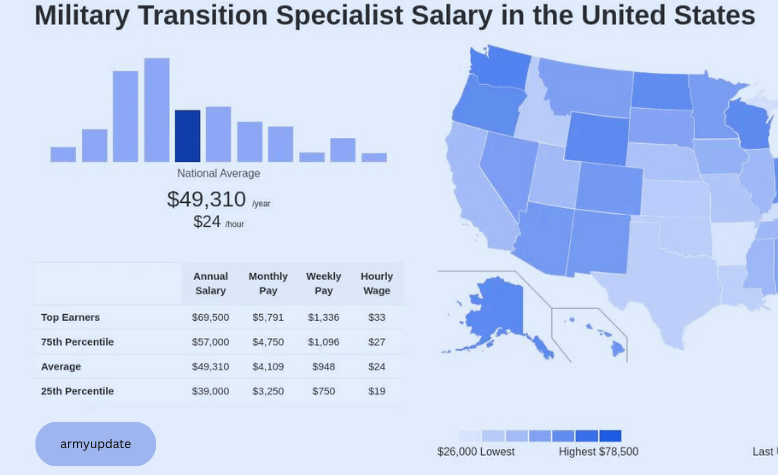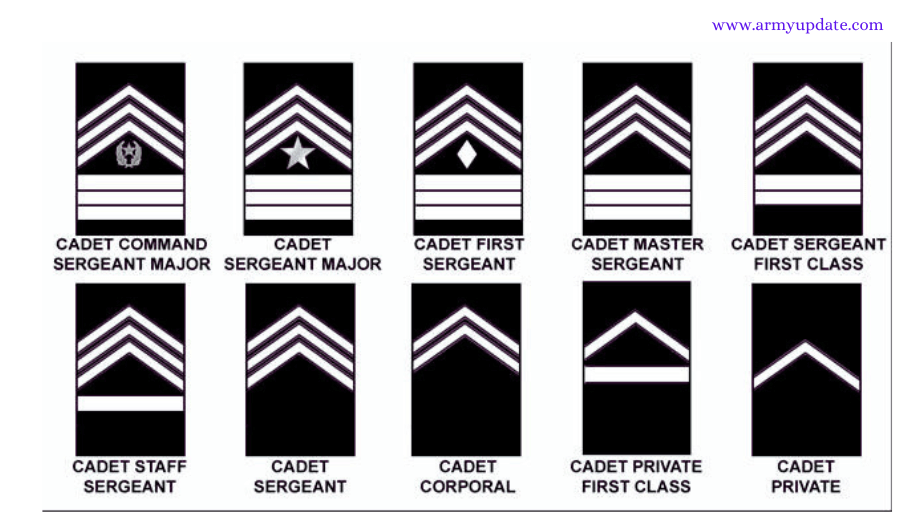10 Things You Should Know About Military Transition Specialist Salary

Are you curious about the salary of military transition specialists? Look no further. In this article, we will uncover 10 essential things you need to know about military transition specialist salaries. From average earnings to factors that can affect income, we’ve got you covered.
Whether you’re considering a career in the field or simply interested in the financial aspect of this profession, read on to discover everything you need to know about military transition specialist salaries.
What is a Military Transition Specialist?
A Military Transition Specialist is a professional who assists military personnel in transitioning from their military careers to civilian life. These specialists provide guidance, support, and resources to help individuals navigate the complex process of transitioning into a civilian workforce.
They understand the unique challenges and opportunities that military personnel face after their service and work closely with them to ensure a smooth transition.
Roles and Responsibilities
The primary role of a Military Transition Specialist is to help individuals translate their military skills and experiences into marketable civilian credentials. They assess the individual’s strengths, interests, and goals to develop a customized career plan.
These specialists also provide job search assistance, including resume writing, interview preparation, and networking strategies. Additionally, they may facilitate training programs and workshops to help military personnel enhance their skills and stay competitive in the civilian job market.
Importance of Military Transition Specialists
Military Transition Specialists play a crucial role in bridging the gap between military service and civilian employment. Transitioning from the military can be challenging for many individuals, as they often face difficulties in translating their military experience into applicable skills that employers understand.
A Military Transition Specialist helps them overcome these obstacles by providing valuable guidance, resources, and personalized support. By helping military personnel successfully transition into civilian careers, these specialists contribute to the overall well-being and successful integration of veterans into society.
 Average Salary of Military Transition Specialists
Average Salary of Military Transition Specialists
The salary of a Military Transition Specialist can vary based on several factors. One significant factor is the geographic location of the position. Salaries tend to be higher in areas with a higher cost of living, such as major cities or regions with a strong demand for these services.
Another factor that influences salary is the level of experience and qualifications. Specialists with more years of experience and advanced certifications may command higher salaries. Finally, the industry and sector in which the specialist works will also impact their salary. Government agencies and consulting firms, for example, may offer higher salaries compared to non-profit organizations.
National Average Salary
The national average salary for Military Transition Specialists in the United States is around $60,000 per year. However, it is essential to note that this figure can vary significantly based on the factors mentioned earlier. It is always a good idea to research the specific industry, location, and organization to understand the salary range more accurately.
Salary Range for Entry-Level and Experienced Specialists
Entry-level Military Transition Specialists can generally expect to earn between $40,000 and $50,000 per year. With a few years of experience and additional certifications, experienced specialists can earn salaries ranging from $60,000 to $80,000 or more annually. It is crucial to note that these are just general estimates, and individual circumstances may vary.
Education and Training Requirements
To become a Military Transition Specialist, a bachelor’s degree in a related field such as human resources, counseling, or social work is often required. However, some employers may consider relevant experience and certifications in lieu of a bachelor’s degree. Additionally, having a background in the military can provide valuable firsthand knowledge and understanding of the unique challenges faced by transitioning personnel.
Special Certifications or Qualifications
While not always mandatory, obtaining specialized certifications or qualifications can enhance a Military Transition Specialist’s credentials and job prospects. The Professional in Human Resources (PHR) certification and Certified Professional Career Coach (CPCC) designation are highly regarded in this field. These certifications demonstrate a higher level of expertise and commitment to the profession.
On-the-Job Training Opportunities
Many Military Transition Specialists gain valuable on-the-job training through internships or entry-level positions in career counseling centers, military assistance programs, or non-profit organizations that support veterans.
This hands-on experience allows them to develop their skills in assisting military personnel in their transition while working under the guidance of experienced professionals. Mentorship programs and continuing education workshops may also be available to further enhance their knowledge and abilities.
Job Prospects and Career Growth
The demand for Military Transition Specialists has been steadily growing as the number of military personnel transitioning to civilian life continues to increase. Government initiatives, like the Veterans’ Employment and Training Service (VETS), have emphasized the importance of supporting veterans through their transition and have led to an increased need for specialists in this field.
Career Advancement Opportunities
Military Transition Specialists can explore various avenues for career advancement. They may progress from entry-level positions to managerial or supervisory roles, overseeing a team of specialists or working in a leadership capacity within an organization.
Additionally, some specialists choose to become independent consultants and expand their services to a broader client base. With the right experience, qualifications, and networking, there are ample opportunities for growth and professional development within this field.
Potential for Higher Salary with Experience
As Military Transition Specialists gain experience, they often have the potential to command higher salaries. With a proven track record of successful transitions and a strong network of professional connections, these specialists can position themselves as experts in the field. This expertise and reputation, coupled with additional certifications and advanced training, can lead to higher-paying opportunities within the industry.
Industries and Sectors Hiring Military Transition Specialists
Government agencies at the federal, state, and local levels often hire Military Transition Specialists to assist veterans in their transition to civilian employment. These agencies include the Department of Veterans Affairs (VA), Department of Defense (DoD), and state workforce agencies.
These organizations recognize the importance of providing comprehensive support to veterans, and Military Transition Specialists play a critical role in achieving this objective.
Private Corporations
Private corporations, especially those with a focus on veteran hiring initiatives or diversity and inclusion programs, also hire Military Transition Specialists. These specialists work closely with human resources departments and hiring managers to ensure veterans’ skills and experiences are effectively translated and valued in the recruitment process. By assisting corporations in hiring and retaining military talent, these specialists contribute to fostering a diverse and inclusive workforce.
Non-Profit Organizations
Non-profit organizations dedicated to supporting veterans often employ Military Transition Specialists. These organizations may offer comprehensive career counseling services, job placement assistance, and ongoing mentorship to transitioning military personnel.
Military Transition Specialists working in non-profit organizations have the opportunity to shape and deliver programs that directly impact veterans’ lives and aid in their successful transition to civilian careers.
Consulting Firms
Consulting firms specializing in veterans’ employment and transition services hire Military Transition Specialists to provide expertise to their clients. These specialists work collaboratively with organizations in various industries to develop and implement tailored strategies for hiring, training, and retaining military talent. Consulting firms offer opportunities for professionals in this field to work with diverse clients and expand their knowledge across industries.
Other Potential Employers
In addition to the sectors mentioned above, Military Transition Specialists may find employment opportunities in educational institutions, career counseling centers, and veteran service organizations. They may also establish their own consulting businesses or work as independent contractors, providing personalized transition services to individual clients. The versatility of this role allows for a wide range of potential employers and industry options.
Geographic Factors Affecting Salary
Geographic location significantly impacts the salaries of Military Transition Specialists. Salaries tend to be higher in states with a higher cost of living, such as California, New York, and Massachusetts. On the other hand, states with a lower cost of living may offer lower salaries. It is important for professionals in this field to research and consider the regional salary trends when assessing potential job opportunities.
Differences in Cost of Living
The cost of living in a particular area can vary significantly, impacting the overall compensation package for Military Transition Specialists. High-cost areas may offer higher salaries to offset the increased expenses associated with housing, transportation, and daily necessities. Conversely, lower-cost areas may offer slightly lower salaries, but with a decreased cost of living, the overall financial situation may still be favorable.
City-Wise Salary Disparities
Salary disparities can also vary within a state or region, based on the specific cities or metropolitan areas. Major cities such as Washington, D.C., San Francisco, and New York City typically have higher average salaries due to the higher demand for services and the higher cost of living.
However, regional economic factors and local market conditions may also play a role in determining salary levels. It is essential for Military Transition Specialists to consider these city-wise salary disparities when making decisions regarding job opportunities.
Benefits and Compensation Packages
Healthcare Benefits
Healthcare benefits are a crucial component of the compensation packages offered to Military Transition Specialists. These benefits often include medical, dental, and vision plans that provide coverage for the specialist and their eligible dependents. Additionally, some organizations may offer flexible spending accounts (FSAs) or health savings accounts (HSAs) to help employees manage healthcare costs.
Retirement Plans
Retirement plans are another essential component of the benefits offered to Military Transition Specialists. Many organizations provide retirement savings plans, such as 401(k) or 403(b) accounts, allowing specialists to contribute a portion of their earnings towards retirement. Some employers may also offer matching contributions to further incentivize retirement savings, providing a valuable long-term financial benefit to the specialists.
Additional Perks or Bonuses
In addition to healthcare and retirement benefits, Military Transition Specialists may be eligible for additional perks or bonuses. These can include performance-based bonuses, incentive programs, flexible work arrangements, professional development opportunities, and paid time off. These additional benefits contribute to a comprehensive compensation package that recognizes and rewards the specialist’s skills, experience, and contributions.
Job Search Strategies
Successful job search strategies for Military Transition Specialists often involve effectively translating military skills and experiences into civilian terminology. This is crucial in creating an appealing and marketable resume and cover letter that highlight the transferable skills valued in the civilian job market.
Specialists can work with career counselors or engage in self-directed research to understand the best methods for translating military-specific skills into language that non-military employers can understand.
Networking and Professional Connections
Networking plays a vital role in job search success for Military Transition Specialists. Engaging in professional networks, attending industry events, and connecting with individuals who have successfully transitioned from the military to civilian careers can provide valuable insights, job leads, and professional connections.
Building and maintaining relationships within the industry can open doors to new opportunities and enhance the specialist’s visibility within the job market.
Resume and Cover Letter Tips
Crafting a well-written resume and cover letter is essential when applying for positions as a Military Transition Specialist. These documents should effectively showcase the specialist’s experience, qualifications, and accomplishments, while also highlighting their unique understanding of the challenges faced by transitioning military personnel.
Customizing the resume and cover letter for each application and tailoring them to specific job requirements can significantly increase the chance of securing an interview.
Interview Preparation Advice
Preparing for interviews is crucial for Military Transition Specialists seeking employment. Researching the organization, understanding the job requirements, and practicing answers to common interview questions can help the specialist feel confident and prepared.
It is also essential to anticipate and prepare for questions specific to military transition, such as inquiries about a candidate’s ability to relate to and support transitioning veterans. Mock interviews and seeking feedback from professionals in the field can further enhance interview performance and increase the chances of securing a desirable job offer.
 Comparable Careers and Salaries
Comparable Careers and Salaries
For individuals interested in assisting military personnel but not specifically as a Military Transition Specialist, there are several comparable careers to consider. Career counselors, human resources specialists, employment coaches, and veterans’ advocates all share similar goals of supporting military personnel in their transition to civilian careers.
These professions provide opportunities to apply similar skills and make a positive impact on the lives of transitioning veterans.
Salary Comparisons to Related Roles
Salary ranges for comparable roles to Military Transition Specialists can vary. Career counselors, for example, earn an average annual salary of around $49,000, while human resources specialists earn an average salary of approximately $62,000 per year.
Employment coaches can earn between $45,000 and $70,000 annually, depending on their experience and qualifications. It is crucial to consider the specific role and the overall compensation package when comparing salaries between related professions.
Resources for Military Transition Specialists
Trade organizations and professional networks provide valuable resources and opportunities for Military Transition Specialists to connect with industry professionals, access educational materials, and stay updated on industry trends.
Organizations such as the National Association of Workforce Development Professionals and the Military Officers Association of America offer memberships, conferences, and online forums where specialists can network, gain knowledge, and develop professionally.
Online Forums and Communities
Online forums and communities devoted to military transition and veteran employment can be excellent resources for Military Transition Specialists seeking support, advice, and the latest industry information. Platforms such as LinkedIn groups, Reddit communities, and specialized online forums like RallyPoint offer a space for specialists to connect with other professionals in the field, ask questions, share experiences, and learn from one another.
Books and Publications
Several books and publications provide valuable insights and guidance for Military Transition Specialists. “Military-to-Civilian Success for Veterans and Their Families” by William D. Anton, “Veterans Transition Guide to Civilian Careers” by Stephen Viscusi, and “Reboot Your Life: A 12-Day Program for Ending Stress, Realizing Your Goals, and Being More Productive” by Paul Gibbons are just a few examples of resources that can help specialists navigate the complexities of military transition and excel in their careers.
Training Programs and Courses
Various training programs and courses are available to enhance the skills and knowledge of Military Transition Specialists. Organizations like American Military University, Kaplan University, and the Institute for Veterans and Military Families (IVMF) offer online courses and certifications specifically designed for professionals in this field.
These programs cover topics such as career development, job search strategies, resume writing, and interview preparation, equipping specialists with the tools and expertise needed to effectively support transitioning military personnel.
Conclusion
being a Military Transition Specialist is a rewarding career that involves assisting military personnel in their transition to civilian life. These specialists play a critical role in providing guidance, resources, and support to ensure a successful integration into the civilian workforce.
The salary of a Military Transition Specialist is influenced by several factors, including geographic location, level of experience, and industry. However, with the right qualifications, experience, and networking, there are ample opportunities for career growth and increased salary.
By staying up-to-date with industry trends, leveraging professional networks, and continuously enhancing their skills, Military Transition Specialists can thrive in this important and fulfilling profession.



 Average Salary of Military Transition Specialists
Average Salary of Military Transition Specialists Comparable Careers and Salaries
Comparable Careers and Salaries



